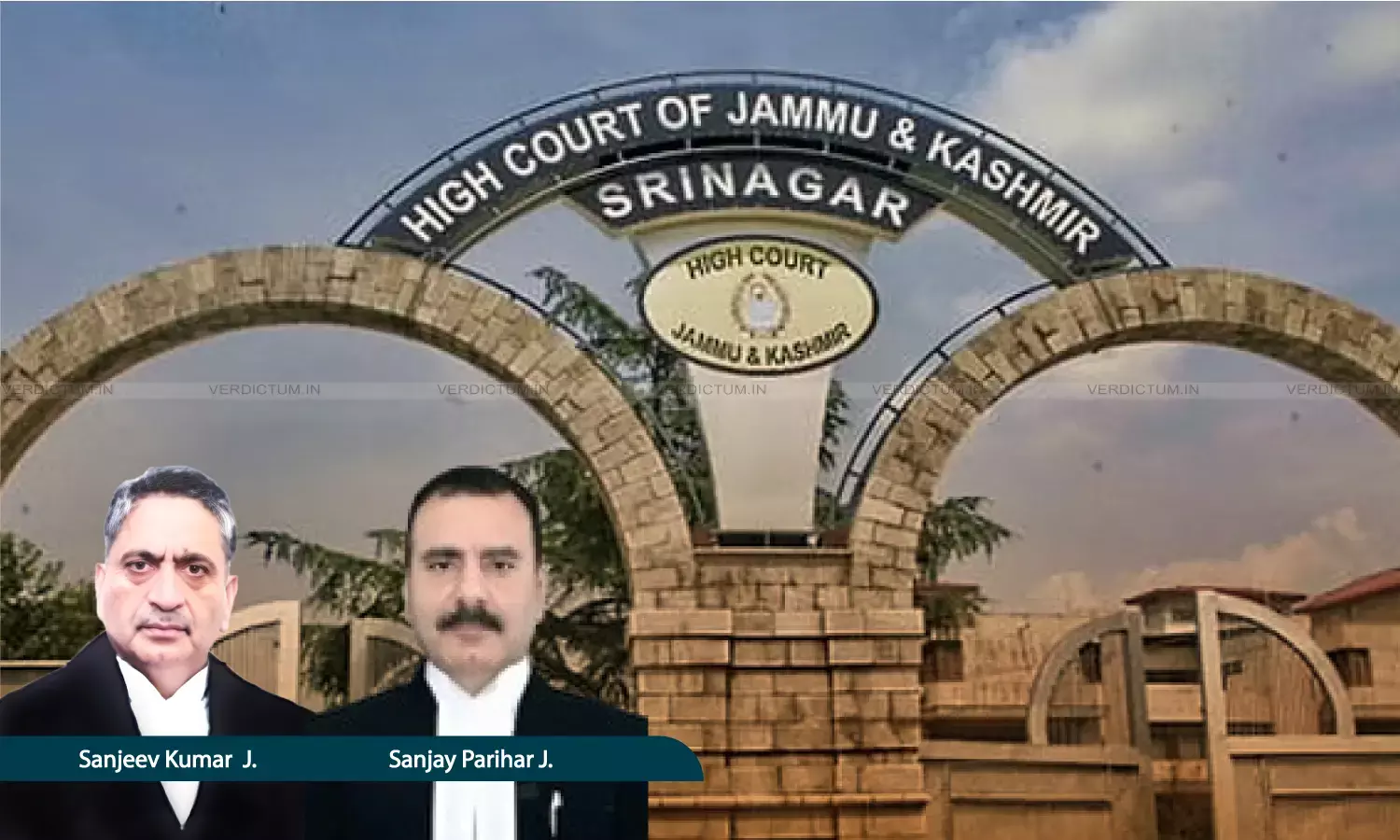J&K And Ladakh High Court Overturns Acquittal Of Former SHO In Kupwara Terror Conspiracy Case; Sentences Him To Life Imprisonment
The Court held that Section 120B is in itself a substantive offence, and even if an overt act does not take place pursuant to the illegal agreement, the offence of conspiracy would still be attracted.

Justice Sanjeev Kumar, Justice Sanjay Parihar, Jammu & Kashmir and Ladakh High Court
The High Court of Jammu & Kashmir and Ladakh overturned the acquittal of a former SHO of the Jammu & Kashmir Police in a terror attack case and sentenced him to life imprisonment.
The Court was hearing an appeal filed by the State against the acquittal of the accused by the trial court in a case relating to the facilitation of a Pakistani militant, who later carried out a fIdayeen attack on a security installation in the border district of Kupwara, causing multiple deaths and injuries.
A Division Bench comprising Justice Sanjeev Kumar and Justice Sanjay Parihar, while overturning the order of the Trial Court, observed,“… the conspirator even though he may not have indulged in the actual criminal operation to execute the conspiracy, becomes liable for the punishment prescribed under Section 302 RPC which is either sentence of death or imprisonment of life.”
Mr. Bikramdeep Singh, Dy. AG appeared for the State, while Advocate M.S. Reshi represented the respondent.
Background
The case arose from an incident in which a Pakistani militant was transported in a police vehicle from Sogam to Kupwara, allegedly at the behest of the then SHO. Witnesses stated that the militant was introduced by the SHO as an SOG operative despite being unable to converse in the local language. The militant, dressed in the missing uniform of a constable, later carried out an armed assault resulting in the death of two CRPF personnel and injuring five personnel of the Jammu & Kashmir Police.
The police filed a chargesheet against the SHO and the Munshi of the police station. The Sessions Judge, Kupwara, acquitted both accused, holding that the evidence was insufficient to establish their guilt beyond a reasonable doubt. Aggrieved, the State filed the present appeal.
Court’s Observations
The High Court scrutinised the testimonies of the official driver and police escorts who consistently deposed that the SHO had instructed them to transport a man in police uniform carrying an AK-47, and had introduced him as an SOG operative. Their statements were corroborated by the evidence regarding the missing uniform of a constable, which was later recovered from the body of the slain militant.
While highlighting that the trial court had erred in discarding reliable evidence on trivial grounds, the Bench held that minor discrepancies in the depositions of other witnesses could not discredit the consistent and corroborated testimony of material witnesses.
Stressing that it is the duty of the Court to separate truth from falsehood, the Bench remarked, “it is the duty of the Court to separate the grain from the chaff, falsity of a particular material witness on a particular fact would not ruin it from the beginning to the end. The maxim “Falsus in uno, falsus in omnibus” has not received general acceptance in our jurisprudence of appreciation of evidence. It only puts the Court on caution.”
Further, the Bench reiterated that conspiracy is a substantive offence distinct from the offence which is the object of the conspiracy. Relying on precedents including Kehar Singh v. State (Delhi Administration) and State v. Navjot Sandhu @ Afsan Guru, the Court observed that “Section 120B is in itself a substantive offence and even if an overt act does not take place pursuant to the illegal agreement, the offence of conspiracy would still be attracted.”
The Bench further held that while generally the High Court must exercise caution when dealing with appeals against acquittals, interference is warranted in cases of manifest error, observing, “…certain guidelines have been laid by the Apex Court in a number of cases on subject. One is that if there are two views on evidence which are reasonably possible, one supporting the acquittal and the other indicating conviction, then this Court, in an appeal against the judgment of acquittal, should not interfere merely because it feels that it would, as a trial Court, have taken a different view. But this Court would certainly interfere if it finds that the findings of acquittal is manifestly erroneous and that the trial Court has acted with a material irregularity or its appreciation of evidence lacks coherence, or it has made assumptions that are unwarranted or its evaluation of evidence, is such, to shock the sense of justice or its reasoning defies the logic or is against the weight of the evidence.”
Ultimately, the Court held that the acquittal recorded by the trial court was unsustainable, observing that the findings in favour of the accused were not only perverse but also reflected a disregard of the material evidence on record. It noted that "The only conclusion reached on the basis of evidence on record pointed towards the involvement of respondent No. 2 and the approach of trial Court in acquitting respondent No. 2 was clearly erroneous in its consideration of the evidence on record."
Conclusion
The Division Bench held that the SHO’s actions in facilitating the militant’s movement and misrepresenting his identity amounted to active participation in the conspiracy and proved the charge under Section 302 RPC read with Section 120B RPC beyond a reasonable doubt. While the acquittal of the Munshi was upheld, the SHO was convicted under Section 302 RPC read with Section 120B RPC and sentenced to life imprisonment.
Accordingly, the acquittal appeal was partly allowed and disposed of.
Cause Title: State of J&K v. Mohd. Ibrahim (Neutral Citation: 2025:JKLHC:242)
Appearances
State: Bikramdeep Singh, Dy. AG.
Respondents: Advocate MS Reshi


